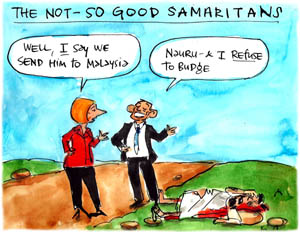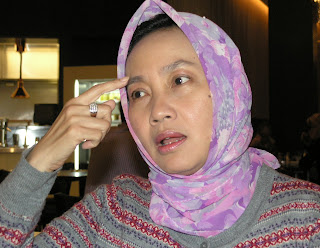Hundreds perish while politicians bicker
The ultimate measure of a man is not where he stands in
moments of comfort, but where he stands at times of challenge and controversy.
By US civil rights leader Martin Luther King Junior’s
definition of leadership, the politicians of Australia and Southeast Asia have
failed appallingly.
They’ve failed because they haven’t found a humanitarian
solution to the issue of asylum seekers moving through the region and dying on
their way to Australia.
If the leaders were public servants they’d be prosecuted for
gross negligence, for lack of duty of care.
Because they are politicians they blame others.
The latest proof of their inability to meet the challenge is the loss during World Refugee Week (w/end 23 June) of maybe 90 souls in the seas south of Java. In the two years before this latest tragedy at least 250 people drowned trying to get to Australia.
There may well be more. Journalists from the ABC TV program Four Corners claim a boat with 97 people on board disappeared in November 2010, unrecorded by authorities.
Added
to the horror of death at sea is the appalling anguish suffered by the victims’
families, desperate people who gambled their relatives for a better future and
lost. They’ll be crippled by grief for
the rest of their lives for making that flawed decision.
Before
this latest catastrophe more than 4,000 people had made it to Australian
territory this year, usually landing at Christmas Island in the Indian Ocean,
just 360 kilometers south of Jakarta.
Asylum
seekers who come from Sri Lanka allege government persecution through links
with the secessionist Tamil Tigers.
Middle Eastern refugees have been fleeing war or religious persecution. Persian-speaking Hazaras, mainly Shiite
Muslims from Afghanistan, Pakistan and neighboring nations have featured
prominently.
Most
refugee boats set off from Indonesia.
People smuggling is illegal.
However the number who openly use the Republic as a transit lounge
between their homeland and Australia indicate the police aren’t doing their job
properly and their political masters are unconcerned.
Others
are setting sail from India, Sri Lanka and Malaysia. The Australian Federal Police are supposed to be working with
regional authorities to detect the asylum seekers before they embark.
Though
police seldom catch the evildoers, journalists have found the people
traffickers who openly organize the boats, charging thousands of dollars for
the risky trip.
Domestic politics in the countries along the route taken by
the distressed seeking safety and a better life, plus a few devious criminals
and economic refugees, have maintained the tragedy.
The
comment most commonly heard among Indonesians is that this is an Australian
problem. Indonesia hasn’t signed the 1951 UN Convention on the Status of
Refugees and its 1967 Protocols, so is perceived to have no responsibility
beyond pointing asylum seekers towards their destination.
To
his credit Foreign Minister Marty Natalegawa has been pushing for a regional
solution. Doubtless to his dismay, no
one seems to have given serious ear to his suggestion, although the Australian
government has been toying with new policies.
One
was to send 800 fresh arrivals to Malaysian refugee camps in return for 4,000
people deemed genuine refugees and deserving of third country settlement.
Prime
Minister Julia Gillard (who was born overseas like one-in-four Australians)
said this would break the smugglers’ business model. They’d run out of customers if the boat people knew they’d spend
years in Malaysia waiting to be processed
However
the plan was scuttled by the High Court.
It ruled that Malaysia was an inappropriate destination because refugee
rights could not be guaranteed.
The
Australian government might be able to legislate around the Court’s
decision. But it would need a clear
majority in Parliament.
‘Border
Security’ is a major issue in Australian politics. The Liberal Party Opposition
wants asylum seekers sent to Nauru in the South Pacific, or Manus Island off Papua
New Guinea.
Those
proved to be genuine refugees would be given three-year temporary protection
visas so they could return home once the threats and dangers had passed.
According
to the UNHCR there are there are 15.4 million refugees worldwide, with 837,500
seeking asylum. Last year Australia took close to 14,000 under its humanitarian
program. The majority were selected by Australian officials working with the
UNHCR in refugee camps around the world.
But
almost 5,000 came by boat – in other words they were self-selected, able to
make the hazardous journey on rickety Indonesian fishing boats. They had the money to pay the people
smugglers, disadvantaging the patient and maybe more deserving poor waiting in
camps overseas.
Left-wing
Australians who previously supported a more liberal refugee program and used
the courts to cripple government plans for offshore processing are rethinking
their position as the boats keep coming – and sinking.
Revelations
that people smugglers have masqueraded as asylum seekers, cleared by
immigration and given permanent residence, have also polluted earlier beliefs
that all boat people are genuine refugees.
Former Liberal PM Malcolm Fraser has savaged Government and
Opposition for the way they’re mishandling the situation.
In a major speech this month (June) he said: “Our treatment
of refugees, and the poisonous debate engaged in by our major political parties
has done Australia much harm throughout our region.”
His comments come when Australia is trying to reposition
itself in Asia as a friend, trader and security partner. Though not a moral
leader. What would Martin Luther King Junior have said?
##
##
Cartoon: Eureka Street
(First published in The Jakarta Post 28 June 2012)
##
.





